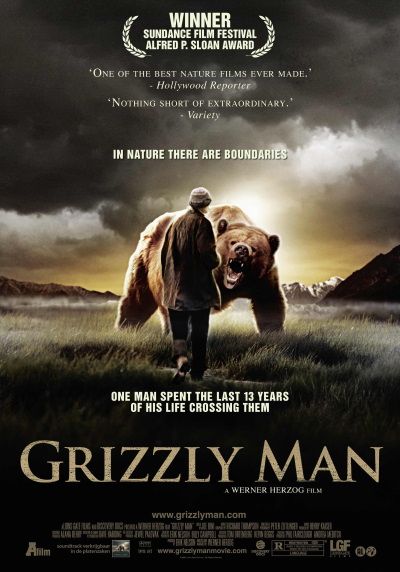Last night I went with my roommate to see Grizzly Man. What attracted me to it was the film's director, Werner Herzog. Herzog makes films, whether they be fictional or documentary, about people who are crazy or go crazy or who just love engaging in staring matches with Nietzschean abysses. (As a side note, he shot part of his Stroszek here in Wisconsin - up in Plainfield, the home of Ed Gein.) Grizzly Man concerns Timothy Treadwell, a man who spent a baker's dozen consecutive summers up in Alaska living among grizzly bears to, in his mind, save the bears from civilization. Treadwell was quite a character and, as we learn, also quite a misanthrope. The film consists of footage shot by Treadwell himself as well as interviews with friends & associates and others who are familiar with bears and their ecology. Like pretty much any Herzog film, Grizzly Man is the story of a man's decent into madness and the director tries to find the kernal of beauty, of humanity in the maelstrom.
Fairly early on, we find out that Treadwell and his girlfriend were killed a couple years ago by a grizzly. In fact, their demises were recorded as they had a video camera running at the time. However, the lense cap was on so the violent scene was captured on audio only. There's a scene in the film where Herzog is listening to the tape which is in the possession of a close friend of Treadwell. Even though we the audience can't hear it and Herzog's face is turned away from the camera, we can see the reactions of Treadwell's friend and its a moving moment. The details of their deaths is told via an interview with the local coroner who had heard the tape and he reconstructs the scene for us with his descriptions of the events captured on the tape.
Treadwell was born into your average middle class family. As a child he shared a love of animals with his mother. After graduating from high school, he sought his fortunes as an actor in Hollywood. His failure at this coupled with drug & alcohol addictions, sent his life into a downward spiral. Treadwell then turned his life around and dedicated it to helping the grizzly. What the video footage he left portrays is a man who deeply loves nature, scorns civilization, and had a lot of inner conflict. There was some genuinely beautiful footage of him interacting with a skulk of foxes that "befriended" him. And then there was a scene of him fawning over of pile of bear shit. He touched it and commented that it was fresh and warm. He then professed his glee that he could touch it because it was a part of a bear that he adored. "It came out of her," he said.
The video footage was shot for videos that he would show to folks in order to drum up support for his organization, Grizzly People. Treadwell died with his then girlfriend, Amie Huguenard. Herzog reveals how she is shown only thrice in the 100 hours or so of footage that Treadwell shot. In fact, Treadwell often had company with him although he went to pains to make sure that his video footage concealed this fact and portrayed him as being alone with nature. This aside, there's some great footage of grizzlies in their natural habitat. We see them looking for food, fighting, and Treadwell is right next to them in several shots spewing his mantras of how he loves the bears and how he would die for them. Elsewhere there's a scene in which Treadwell is giving a summary of a summer he spent with the bears and he goes off on a vitrolic tirade against the federal park rangers (he spent his time on Katmai National Park and Reserve). Herzog makes a comment on how he's seen this before on a movie set which prompted my pal and I to look at one another and laugh. (Herzog's tempestous relationship with actor Klaus Kinski is chronicled in his My Best Fiend.)
Perhaps the most revealing moment was a scene in which Treadwell is kneeling beside the corpse of a fox and mourning its death, seemingly unable to reconcile his bucolic view of nature with its harsh reality. At this point Herzog chimes in. It's a wonderful moment in cinema. Documentaries usually have a dispassionate/objective narrator who merely chronicles events. But here Herzog comments on his ideological disagreement with his subject. He basically says that Treadwell viewed the universe as being harmonious whereas he - Herzog - thought that the universe was about chaos, conflict, and murder. It is a very revealing moment both about the subject and the filmmaker. It also provides a super-concise description of Herzog for anyone not familiar with his work.
01 September, 2005
A Hobbesian View of the Universe
Labels:
Film,
Movies,
Werner Herzog
Subscribe to:
Post Comments (Atom)

No comments:
Post a Comment